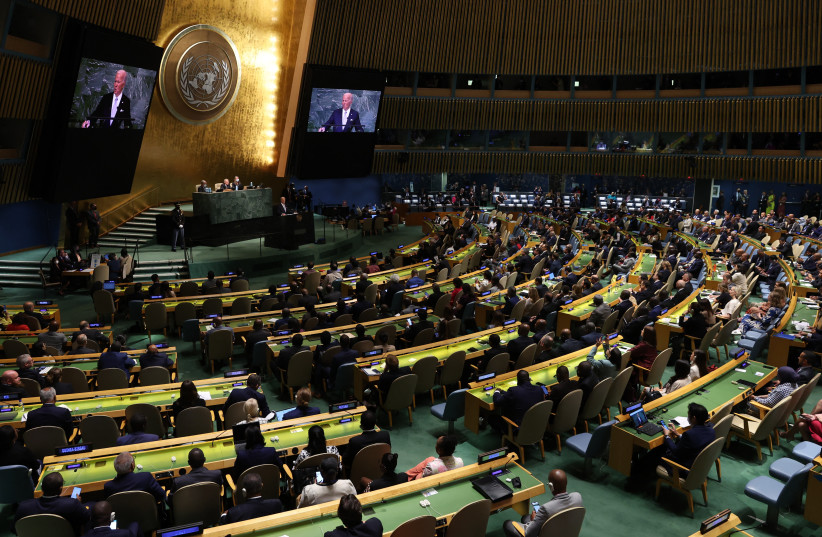PA officials said on Thursday that Prime Minister Yair Lapid’s talk about a two-state solution during his speech before the UN General Assembly was a “step in the right direction that needs to be followed up with real measures.”
The officials, however, warned that Israel’s security measures in the West Bank and other policies, including settlement construction and land-grabbing, are destroying the prospects of peace and undermining the Palestinian Authority’s rule and credibility.
The Lapid government’s actions show that it is working to sabotage the two-state solution, a senior PA official told The Jerusalem Post.
“The daily [military] raids, arrests and killings in the West Bank show that this government is not different than previous ones,” the official said. “And don’t forget the ongoing construction and expansion of the settlements, which threaten to end the two-state solution.”
Another official told the Post that the Palestinians were satisfied with the growing support in the international arena for the two-state solution.

But he too warned that the talk about the two-state solution was not enough unless it was accompanied by real measures to safeguard it.
The PA Ministry of Foreign Affairs noted that Lapid’s talk about a two-state solution has caused an uproar among many Israeli politicians who are totally opposed to the establishment of a Palestinian state.
The ministry said the voices and policies of those Israelis who oppose the two-state solution won’t stop the Palestinians from pursuing their right to self-determination and the establishment of an independent Palestinian state with east Jerusalem as its capital.
“These positions threaten to explode the situation and sabotage any efforts to achieve security and stability in the region,” the ministry cautioned.
Abbas, Shtayyeh reiterate support for two-state solution
PA President Mahmoud Abbas and PA Prime Minister Mohammad Shtayyeh, who are in New York for the General Assembly session, reiterated their support for the two-state solution.
Abbas was quoted as saying during a series of meetings with world leaders and representatives of the Palestinian community in the US that the only way to achieve a just and lasting peace that would lead to the establishment of a Palestinian state was through adherence to all UN resolutions pertaining to the Israeli-Arab conflict.
Abbas was further quoted as accusing the Israeli government of continuing to undermine any opportunity to achieve a just peace “through its continued policy of settlements, incursions, arrests and land confiscation.”
Shtayyeh said during separate meetings with US and European Union officials that the talk about a two-state solution needed to be backed by “practical measures.”
“The mere call for the two-state solution is insufficient,” Shtayyeh stressed. “The important thing is to implement and protect this solution, especially in light of the systematic Israeli measures that destroy it, such as settlement construction and land confiscation, as well as the continued incursions into Palestinian cities, killings, arrests and house demolitions.”
Shtayyeh claimed Israel was “weakening” the PA on the ground through its measures, including the deduction of tax revenues belonging to the Palestinians in response to payments to families of Palestinian prisoners and “martyrs.”
